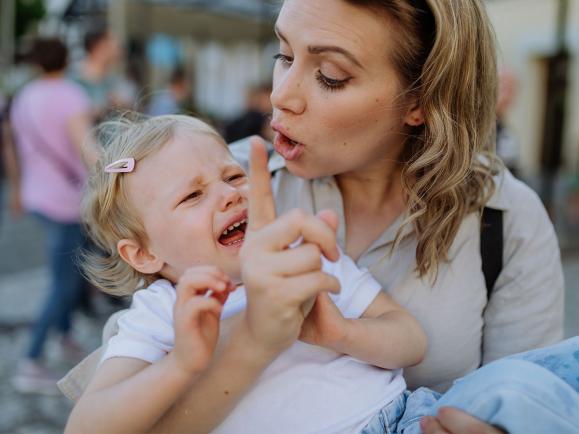
Let's talk about shouting. Maybe you shout at your kids all the time, maybe it happens sporadically (but intensely) or maybe it hardly ever happens at all. If you don't yell at your kids, congratulations. If you do, you're human. That said, let's take a look at what all that yelling is actually doing to your child and how you can cut that habit out of your family's life:
First of all, yelling isn't always bad.
Yes, you read that correctly. Yelling is sometimes helpful and even necessary. At least, that's what family coach Maria Catila says. "Shouting is like a human fire alarm. Use with caution and only as a signal of danger."
Yelling is an effective form of warning your kids about a potentially dangerous situations. That said, yelling should only be a method of warning, not part of a punishment or the way you handle day to day mishaps.
Here's what it is doing to your child.
If you're trying to get your child to stop a certain behavior or calm down, continuous yelling is not the way to do it. If you react calmly it promotes reassurance and love in your child.
The opposite is true if you're yelling. It prompts a toddler's brain to enter its fight, flightor freeze mode. Yelling may cause your child to reciprocate aggression towards you (they may hit you). It may also cause your child to run away or just stare at you fearfully. In the longterm, studies have shown that yelling "makes children more aggressive, physically and verbally."
Yelling teaches your kids that you're not serious until you yell.
Oftentimes we yell at children with that hope that they'll learn to cooperate without the yelling next time. What is really teaches them is that you're not serious until you start yelling.
This article gives some fantastic suggestions to help you avoid the shouting and increase cooperation between you and your child.
Yelling is not an effective form of communication.
Sometimes we shout under the ill-conceived notion that if we're speaking loudly (or, shouting) it will be easier for our child to remember what we're saying. That's not really the case.
You may be making every bit of sense, but if you're shouting it, it's not going to sink in as effectively as calmer methods (unless danger is involved).
"Shouting doesn't get the message across to children, young or old, because children are too busy defending themselves from a perceived or real danger and totally miss the point," clinical psychologist Dr. Deema Sihweil points out.
Yelling destroys trust.
This makes sense. Consistently capitalizing on fear in order to get your way is always going to wear down the trust your child has in you.
Instead of yelling, Dr. Laura Markham suggests handling situations differently. Approach the problem with a sense of humor or give your child calm warnings about picking up his toys and getting to bed on time. React to a situation with empathy from your child's perspective, instead of reacting to the mess or problem (see how much fun your child is having before bed, not the giant pile of Legos).
You're probably not going to be perfect, but try to keep your cool
It's not easy to stay calm when it's three o-clock in the morning and your kids are wide awake. It's going to get on your nerves when your little boy empties the contents of your purse for the fifteenth time. But staying calm is going to pay off - you'll raise kids who trust, not fear and who love, not fight.
If your parents constantly yelled at you when you were younger, don't let the tradition continue. Be the bigger parent. Develop patience and express your love. If you mess up, correct the situation and move on.

